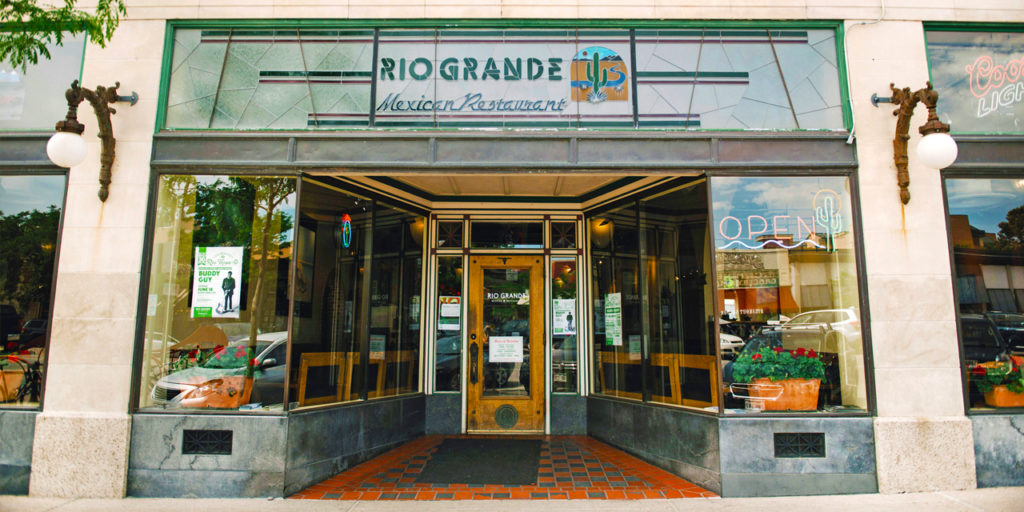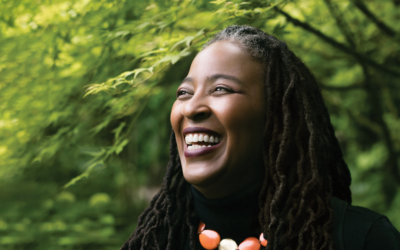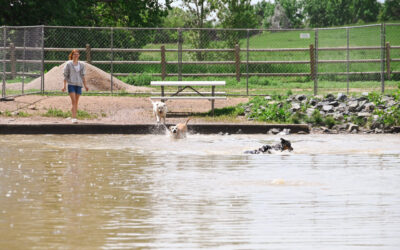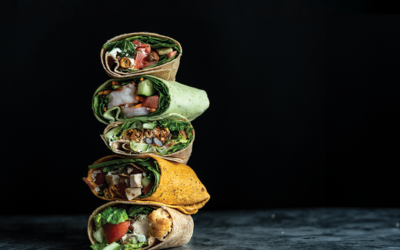Some NOCO companies are walking the talk and taking their responsibility to the environment seriously. Here’s a PR tip: People who care about environmental stewardship are a bit wary of the term “green,” which gets thrown around a lot. That said, you’d be surprised how many Northern Colorado companies have prioritized waste reduction and resource efficiency, pioneering new technologies or adopting processes to curb pollution. Here are three of them.
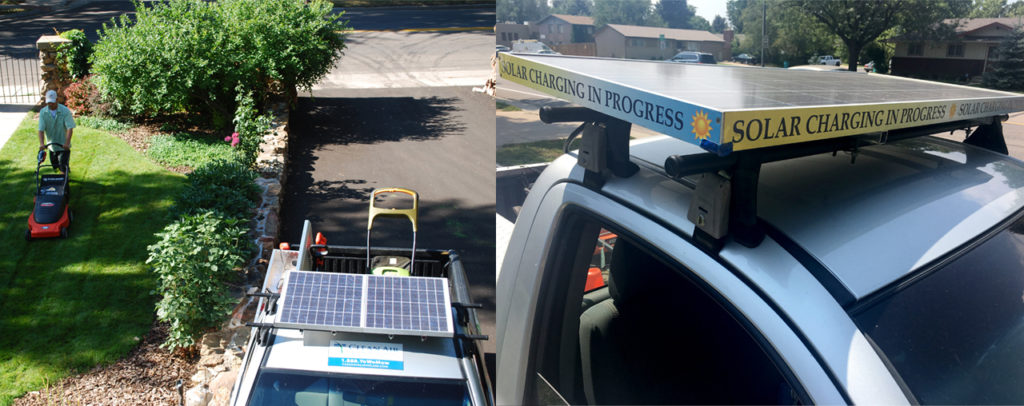
Clean Air Lawn Care uses trucks equipped with solar panels to power lawn mowers.
Clean Air Lawn Care
Sustainability is, for some businesses, a call to arms. When Kelly Giard founded Clean Air Lawn Care in Fort Collins in 2006, it was inspired by a benign obsession with small engine emissions.
“We’re now into the chemical piece of it too with organic [lawn products], but when it started it was the pollution piece that was so compelling,” states Giard, who was a stock broker prior to founding Clean Air.
“At the time, the EPA (Environmental Protection Agency) said 10 to 12 percent of the nation’s air pollution was coming from small engines, and the majority of that was coming from lawn care small engines. I did some late-night research on that, probably around 2003…and then in 2005 I hired an intern to research the equipment to see if there was anything out there that could actually get the job done.”
That was quite the challenge.
“It was very difficult. We ended up buying a couple of riding mowers from a company out of Canada that did not work well. So, we defaulted to just small push mowers from Black & Decker. When we first started we couldn’t do anything larger than a medium-sized residential house.”

“A lot of people think that organic doesn’t work, but if you do it right, it makes the grass a better shade of green.” —Kelly Giard Founder of Clean Air Lawn Care in Fort Collins
Thus, Giard jokes that his business began with poor-quality equipment and skeptical customers. With franchise operations now in about 18 states, those tenuous early days are easy to kid about.
Giard tried biodiesel mowers for several years, which ultimately proved not to be a viable solution—another promising idea down the tubes. Clean Air at last found an acceptable battery-powered mower, partnering with Black & Decker. It was still problematic because in those early models the batteries were not removable. That meant when the battery went kaput, your motor went with it.
In time, getting a removable power system in place and transitioning to lithium-ion batteries were game changers spurred in part by the partnership between Clean Air and Black & Decker.
Clean Air Lawn Care became a franchise in 2008 (while still working out all those technical kinks), with the obvious benefit of scalability. A less obvious benefit was gaining access to talented collaborators. In the fall of 2013, Girard organized a summit with about 10 franchise owners, each with an in-depth grasp of lawn care, to collaborate on formulating organic fertilizers. Two products resulted—one pelletized fertilizer and one liquid.
The pelletized products are made of things like alfalfa, corn, soybeans, molasses and kelp, explains Girard. The liquid product works differently, enriching root systems with a combination of ingredients including mycorrhiza, a fungus, and humic acid.
“A lot of people think that organic doesn’t work,” Giard says, “but if you do it right, it makes the grass a better shade of green” that maintains a more consistent appearance.
Finally, all of Clean Air’s trucks are fitted with 130-watt solar panels, which powers all lawn equipment most of the time. Impressive.
M&E Painting
For firms without an environmental cause at their core, waste reduction initiatives are often sensible business decisions. Loveland-based M&E Painting recently digitized all its contracts and adopted a paperless documentation system, recycling thousands of forms from 13 years in business.
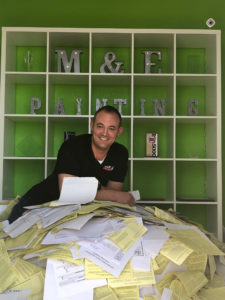
“I think it could save each team member a couple hours a week, so if you’ve got ten team members in the office that are messing with paper at 20 hours a week [you’re saving] 80 to 100 hours a month.”
—Matt Shoup
Founder of Loveland-based M&E Painting
“I think it could save each team member a couple hours a week,” Shoup estimates, “so if you’ve got ten team members in the office that are messing with paper at 20 hours a week [you’re saving] 80 to 100 hours a month.”
The initiative, enacted by director of operations Melanie Hoobler, was difficult to implement, but it’s been well-received.
M&E also uses odorless, low- or no-VOC (volatile organic compounds) paints for most interiors, benefiting indoor air quality and occupant health. This used to be an upgrade but is becoming the standard, in part because the price differential between conventional and no-VOC paints has been shrinking. For M&E’s work in retirement communities they’re taking it a step further with Paint Shield, a product developed by Sherwin Williams that kills e-coli and staphylococcus bacteria.
Rio Grande Mexican Restaurant
Rio Grande Mexican Restaurant, known simply as “the Rio,” has long embraced waste reduction efforts that many restaurant industry professionals might feel exhausted just thinking about. Overall, it’s been a clear win from an environmental standpoint, a modest drain from a bottom-line standpoint and a crazy game of cat and mouse from an operational standpoint.
Erich Whisenhunt was the kitchen manager at the Rio’s Fort Collins location for nine years, prior to becoming director of food and beverage. As kitchen manager, he oversaw several initiatives including a food waste composting effort that, at its peak, was diverting 15,000–17,000 pounds of waste a month. The Rio also uses glass-only recycling, single-stream recycling, cardboard bailing and other waste diversion methods. The Fort Collins branch has its own cardboard bailer.
“It’s pretty unique for a business of our size,” notes Whisenhunt. “We produce a bail every five to seven days and I think they average between 800 and 1,000 pounds.”
The Rio recycles its waste vegetable oil through a partnership with ClearEcos, which turns it into biodiesel and cleaning solvent. Between the half-dozen or more discrete waste diversion efforts, a huge volume of waste gets diverted from the landfill, recycled or upcycled into something useful. The Rio also buys wind energy credits to offset its energy needs and is part of the city’s ClimateWise program.
One thing to take away from this is that environmental stewardship can save money on raw materials, disposal fees or regulatory compliance. You don’t have to be a business prodigy to recognize the bottom-line case for resource efficiency. Just don’t count on it every time—often enough, it’s a values call.
“Recycling doesn’t get much yield on return these days,” explains Whisenhunt. “When we were doing cardboard bails, there was a point where we were getting payback from Gallegos, when cardboard was worth money. But it’s not worth money anymore, so.… we just pay for everybody to take our stuff.”
John Garvey is a Fort Collins-based business journalist and freelance writer. To comment on this article, send an email to letters@nocostyle.com.



